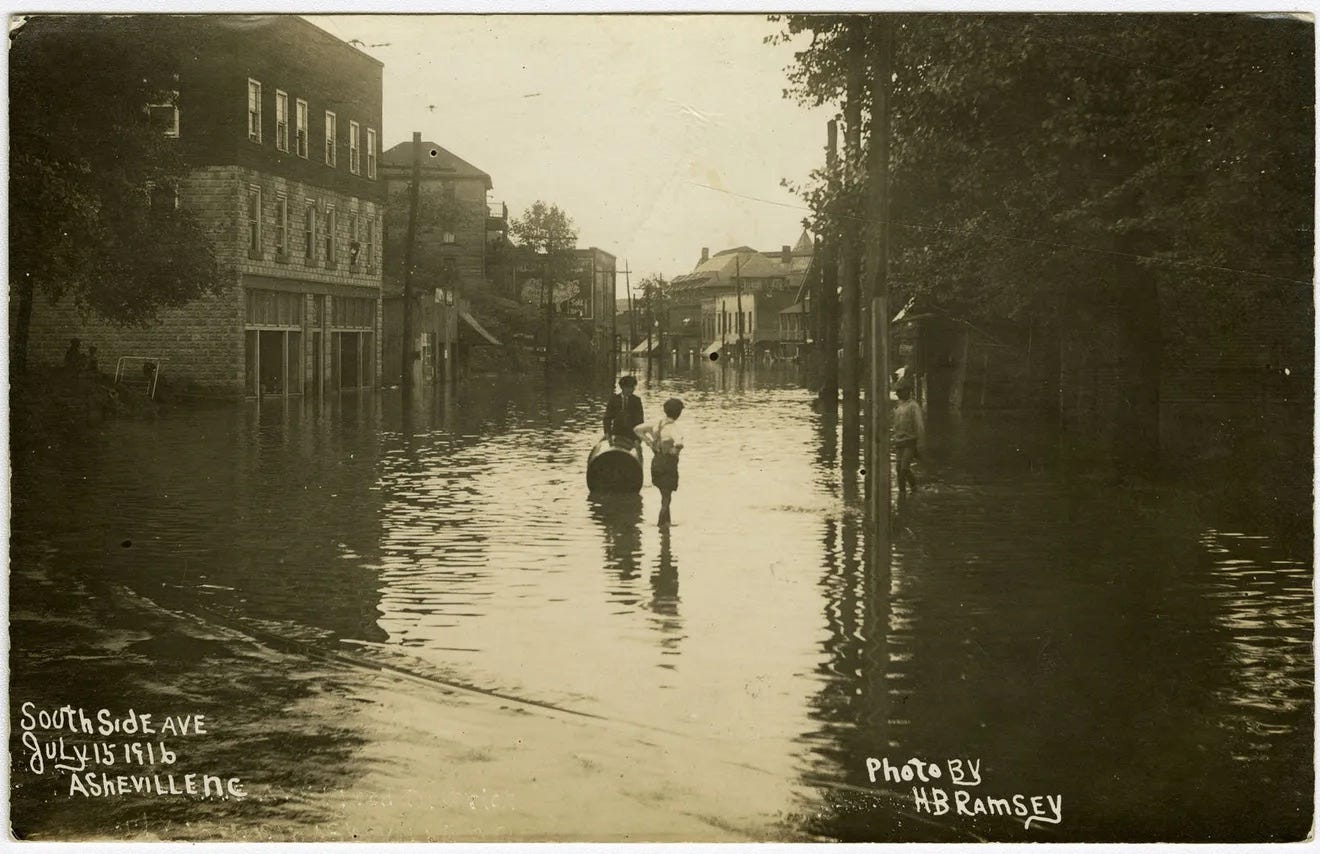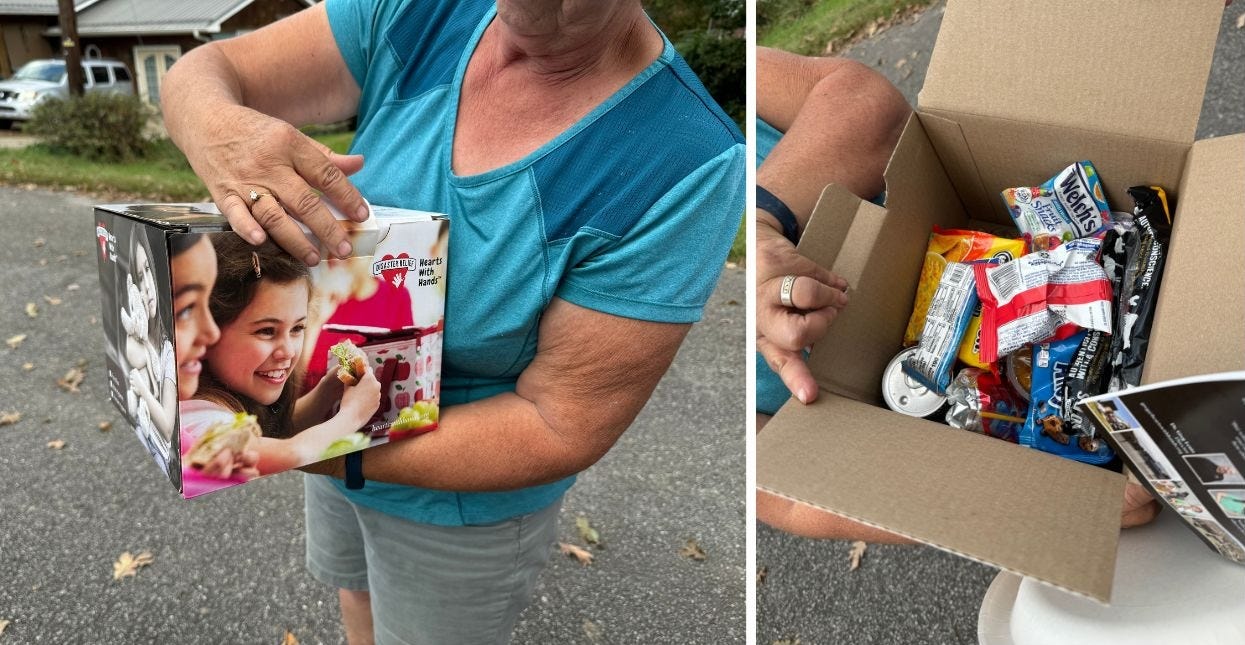The fear of ‘donation fatigue’
Plus: Thousands still without power, water; Cherokee tribe loses trout stock; Volunteers conduct nearly 16,000 welfare checks in Buncombe; Nonprofit delivers relief boxes to kids
You’re reading Mountain Updates, a free pop-up newsletter from The Charlotte Ledger examining the crisis and recovery in the N.C. mountains. Ledger subscribers can add Mountain Updates on their “My Account” page.
Sign up for free:
The amount of supplies that has poured into Western North Carolina over the past week has been overwhelming in the best way. People from all over the country have generously donated and trucked in items like cases of water, cans of food and boxes of snacks, cleaning supplies, propane tanks, diapers, baby formula and much, much more.
While grateful for the support, some high-traffic cities and towns in Buncombe County — like Asheville and Black Mountain — are asking for a pause on supply donations. There’s only so much room to store everything, and donation sites need some time to distribute the supplies they have before getting more.
There’s also an unspoken fear in Western North Carolina of donation fatigue. People want to help while the devastation is raw. Again, it’s appreciated. But Western North Carolina’s recovery will take a long time. It’s going to take weeks (possibly months) to repair water systems, grocery stores and roads, and supplies will be needed then, too.
That’s why the best way to support Appalachia right now, if you’re looking to donate, is through monetary contributions. Relief organizations need funds to continue to operate in the area, and they’re on the scene assessing the immediate and long-term needs of communities. They also have the resources to get supplies into hard-to-reach areas. You can find a list of relief organizations at the end of this newsletter.
Another way to support the area is by continuing to spread the word. Don’t forget about Western North Carolina these next few months, especially around Christmastime. Families who were completely devastated by the hurricane will need help purchasing gifts for their children.
Here’s the latest news from our mountain neighbors:
Thousands still without power: Duke Energy has warned customers in Western North Carolina that some may face extended power outages due to Hurricane Helene's damage, the N.C. Tribune reported today. While most affected customers are expected to have power restored by midnight Tuesday, about 103,000 customers in the state remain without electricity, particularly in Buncombe and Henderson counties, where 45% and 29% of customers, respectively, had no power as of Monday afternoon. The situation is dire for local electrical cooperatives, such as Rutherford EMC, which reported that 88% of its power-line mileage was damaged.
Even more are without water: Some water pipes have come back online in Buncombe County, but for a majority, it’s been 10 days without water, and a definitive timeline for water restoration has not been determined. (WLOS)
Voting plan update: The N.C. State Board of Elections announced Monday that early voting will proceed as scheduled in all 100 counties beginning Oct. 17. All election offices have been reopened, but about 10 early voting sites are currently unusable. State elections officials are making it easier to vote by mail in 13 of the hardest-hit counties, and bipartisan teams will also be allowed to visit shelters to help voters request and complete ballots. Early voting runs through Nov. 2, and Election Day is Nov. 5. (WFAE)
State park closures: All state parks west of I-77 — including those in the Charlotte region, such as Crowders Mountain State Park in Gaston County and Lake Norman State Park in Iredell County — will remain closed until at least Oct. 31 because staff are helping with emergency efforts, the N.C. Division of Parks and Recreation said on Instagram. (Observer)
Henderson County reports 7 deaths: Henderson County officials has reported seven storm-related deaths and over 230 damaged structures, with 70 being total losses. (WLOS)
Tribe loses fall trout stock: Helene’s flooding swept away 30,000 rainbow trout from the Eastern Band of Cherokee Indians’ hatchery, severely reducing the stock for upcoming fishing seasons, the Asheville Citizen Times reported. Doug Reed II, the tribe's fisheries manager, expressed the emotional toll of losing the trout, which he compares to “our kids.” Though some trout survived, the loss will result in fewer fish for non-member anglers this fall.
Biltmore Estate pledges $2M: The Biltmore Estate, located in Asheville, has established the “Biltmore Relief Fund for WNC” and pledged $2 million to support relief efforts. Despite the estate’s closure due to storm damage and infrastructure issues, Biltmore aims to assist emergency response teams, employees and local non-profits during the recovery process. Biltmore is expected to reopen to guests on Oct. 15.
Ingles takes major blow: Ingles Markets, one of the main grocery chains in Western North Carolina, reported “unprecedented destruction” to its distribution center in Black Mountain, which has led to multiple store closures and a 15% drop in stock value. While other grocery stores like Whole Foods and Publix quickly resumed normal operations, many rural communities that rely on Ingles for groceries continue to struggle as they await recovery efforts. (The Assembly)
Volunteers search for missing people: Buncombe County’s Family Assistance Center, led by the Register of Deeds office, organized over 2,600 volunteers to conduct wellness checks on nearly 16,000 households. These checks confirmed the safety of 13,049 residents, providing essential supplies and peace of mind in areas with downed power and communication. (Asheville Citizen Times)
Remembering Madison County officer and mother: The Asheville Citizen Times shares the story of Maj. Michelle Quintero of the Madison County Sheriff's Office, who tragically lost her life while responding to Helene on Sept 27. Known as “the matriarch of a law enforcement family,” she was a beloved figure in her community, often supporting juvenile inmates and being a maternal presence to many, including her own two children. Her legs became pinned under debris near her house in rising flood waters. “Mom never came back up,” her daughter told the paper.
Helene surpasses records set by the ‘Great Flood of 1916’
Until Helene, the “Great Flood of 1916” was the deadliest storm to hit Western North Carolina. It was one of those events that if you lived through it, you talked about it for the rest of your life. (Like my great-grandmother, recalls my mother.) The “great flood” crested at about 22 inches of rain and took about 80 lives.
Less than two weeks ago, with nearly two feet of rain in some areas of North Carolina and reported deaths in the hundreds, Hurricane Helene has already surpassed the severity of the 1916 flood — and the full extent of loss is still being uncovered.
The Asheville Citizen Times recently published an article comparing the two floods that’s worth a read. There are also a few archived library photos captured from the 1916 event.
The Citizen Times caption reads, “Sepia realphoto postcard showing Southside Avenue during the flood of July 1916 as two people stand in the submerged street. This area was another one of Asheville's thriving Black business districts.” (See more photos here.)
Those who experienced the wrath of Hurricane Helene are likely to tell the story of its devastation for decades to come.
Quotable: Asheville is feeling a little weird
From Kevin Williamson, writing in The Dispatch in an article published Monday, about the vibe he encountered in Asheville:
So, the traffic is definitely a little weird in Asheville right now: a brace of black helicopters overhead, straight out of your favorite conspiracy theory; tight little pelotons of law-enforcement and emergency vehicles rushing down the Billy Graham Freeway with flashing blue lights; a phalanx of black SUVs for the FEMA guys strutting around in their pressed polo shirts; big silver tanker trucks with “POTABLE WATER” emblazoned on them; flatbed trucks packed with diesel generators and ATVs for bringing supplies to hard-to-reach places; trailer loads of bottled drinks and construction supplies, the trucks throwing up dust from highways covered with a thin pink sediment from having recently been underwater. …
Except for one section of downtown spared thanks to buried power lines, there’s no electricity—which means no functioning gas and diesel pumps in most of the city. There’s no running water, which means no water for drinking or cooking, for showers or for toilets. Cellular service was out for days, leaving people unable to call for help or to check on family and friends (though connectivity has been intermittently restored). … the hospital didn’t have [access] to usable running water, a problem that it got around with the most old-school solution possible: Workers dug a well, practically overnight.
Wells, printed signs, moving goods on handcarts: There’s a lot of old-fashioned technology that has come back into vogue in Asheville since the storm. Up in the mountains, resourceful volunteers are using pack mules to bring insulin to patients in remote homesteads.
Weird thing is: You can still get a cold beer.
Photo of the day: A mountain-based nonprofit delivers relief boxes to children
Schools in four counties are closed indefinitely. Hearts with Hands, a disaster relief organization based in Asheville, drove around Swannanoa on Sunday afternoon delivering “boxes of hope” to neighborhood children. The box included snacks like fruit gummies, juice pouches and cookies.
Watch: Drone video of downtown Marshall shows the full extent of infrastructure damage

 Tiktok failed to load.
Tiktok failed to load.Enable 3rd party cookies or use another browser
How to help
People have really shown up for Appalachia this week with supply donations. Monetary donations are needed just as much. Many organizations have deployed groups across the region, tasked with distributing food, water and supplies. You can donate to their efforts at the links below.
Hearts with Hands, a local disaster relief organization, has a donation page to provide food, supplies and water.
United Way of North Carolina has established a fund to help residents affected by the flooding.
MANNA Foodbank, which serves 16 counties in Western North Carolina, is accepting food, supplies and monetary donations. The organization’s warehouse on Swannanoa River Road in Asheville was damaged by the hurricane.
The American Red Cross is accepting donations to help residents in the Southeast.
Samaritan’s Purse, which is headquartered in Boone, is scheduling volunteers to help with debris cleanup.
Operation Blessing has a donation page to provide food, supplies and water.
The Salvation Army, which is operating in Buncombe, Haywood, Henderson, Transylvania and Watauga counties, serves meals, drinks, snacks and hygiene kits.
—
Lindsey Banks, a native of the Buncombe County town of Swannanoa, is a staff reporter with The Charlotte Ledger. Reach her at lindsey@cltledger.com.
Recent editions of the Mountain Updates newsletter from The Charlotte Ledger
“Returning to a hometown in survival mode” (Monday)
“Fixing all of those washed-away roads” (Sunday)
“How Helene could scramble the election” (Saturday)
➡️ Learn more about The Charlotte Ledger
Need to sign up for this e-newsletter? We offer a free version, as well as paid memberships for full access to all of our local newsletters:
➡️ Opt in or out of different newsletters on your “My Account” page.
The Charlotte Ledger is a locally owned media company that delivers smart and essential news through e-newsletters and on a website. We strive for fairness and accuracy and will correct all known errors. The content reflects the independent editorial judgment of The Charlotte Ledger. Any advertising, paid marketing, or sponsored content will be clearly labeled.
Like what we are doing? Feel free to forward this along and to tell a friend.
Social media: On Facebook, Instagram, Twitter and LinkedIn.
Sponsorship information/customer service: email support@cltledger.com.
Executive editor: Tony Mecia; Managing editor: Cristina Bolling; Staff writer: Lindsey Banks; Business manager: Brie Chrisman






